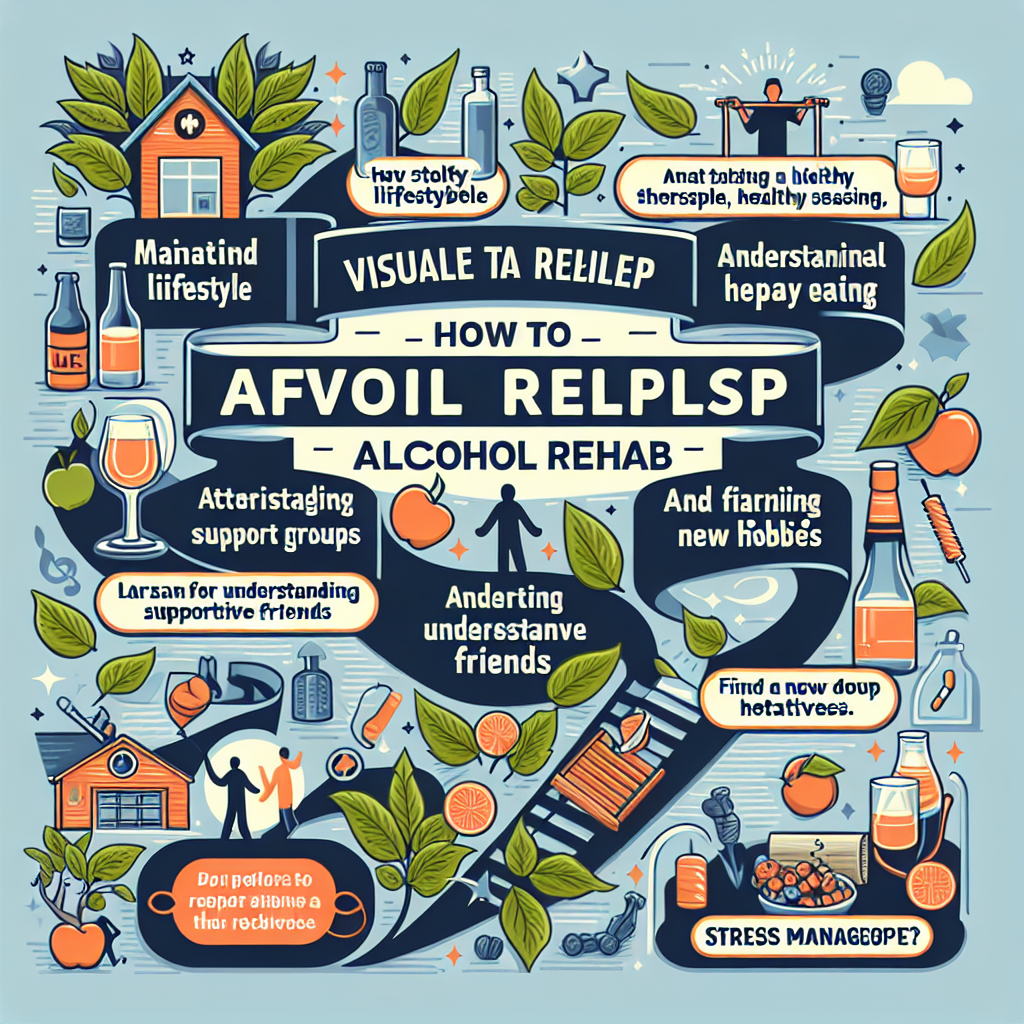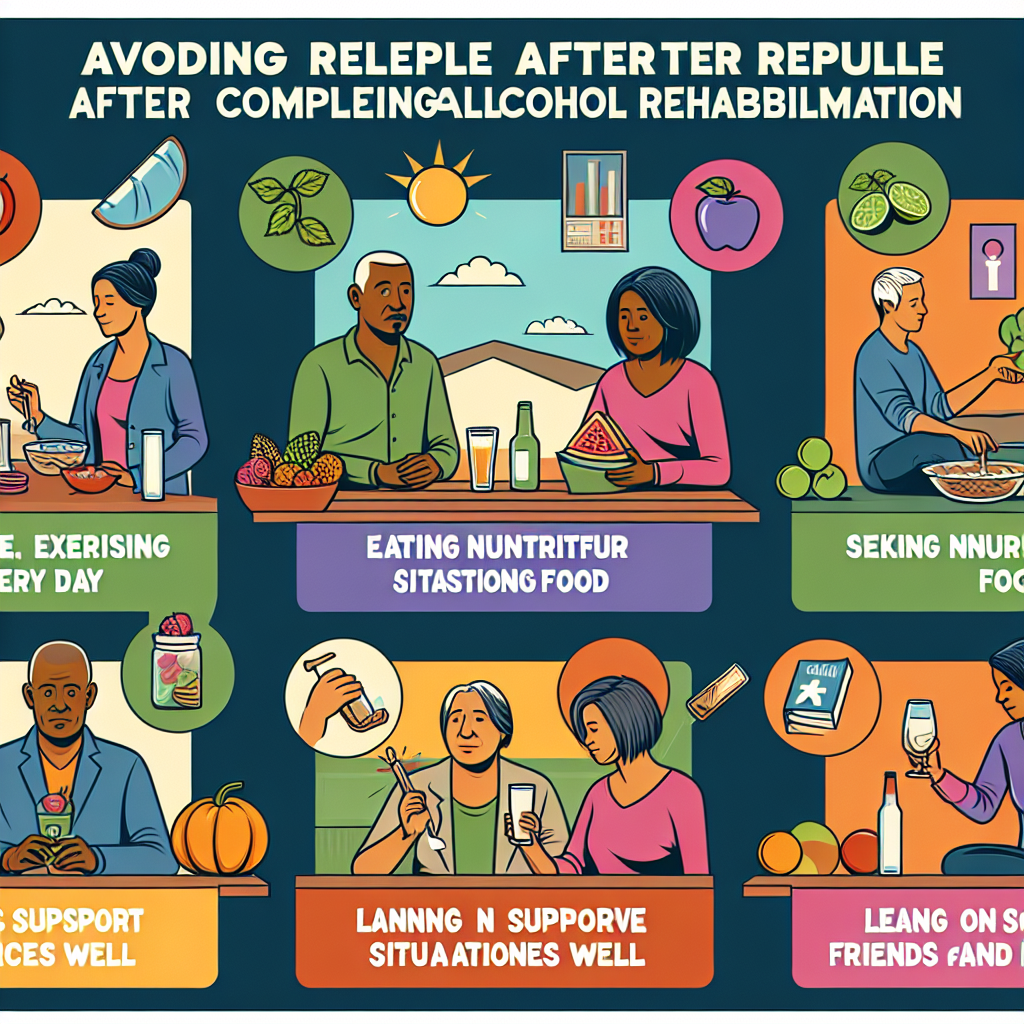-
Table of Contents

“Stay Strong, Stay Sober: Your Guide to Lasting Recovery”
Introduction
Avoiding relapse after alcohol rehab is a critical phase in the journey to long-term sobriety. It requires a comprehensive strategy that includes understanding triggers, building a strong support network, and adopting healthy lifestyle changes. This introduction will explore key methods to maintain sobriety, such as engaging in ongoing therapy, participating in support groups, and developing coping mechanisms to handle stress and cravings. By implementing these strategies, individuals can significantly reduce the risk of relapse and continue on the path to recovery.
Strategies To Maintain Sobriety Post-Rehab
Maintaining sobriety after completing an alcohol rehab program is a significant achievement, but it is also a continuous journey that requires dedication and strategic planning. One of the most effective strategies to avoid relapse is to develop a robust support network. Surrounding yourself with people who understand your journey and can offer encouragement is crucial. This network can include family, friends, support groups, and therapists. Engaging in regular meetings with support groups such as Alcoholics Anonymous (AA) can provide a sense of community and shared experience, which can be incredibly comforting and motivating.
Another essential strategy is to create a structured daily routine. Having a predictable schedule can help reduce the uncertainty and stress that often lead to cravings. Incorporating healthy habits such as regular exercise, balanced nutrition, and adequate sleep can significantly improve your physical and mental well-being. Exercise, in particular, has been shown to reduce stress and anxiety, which are common triggers for relapse. Additionally, engaging in hobbies and activities that you enjoy can provide a positive outlet for your energy and emotions, keeping your mind occupied and away from thoughts of alcohol.
Mindfulness and meditation practices can also play a pivotal role in maintaining sobriety. These techniques help you stay present and aware of your thoughts and feelings, allowing you to manage stress and cravings more effectively. By practicing mindfulness, you can develop a greater sense of control over your reactions and make more conscious decisions that support your sobriety. Meditation can also help you cultivate a sense of inner peace and resilience, which can be invaluable during challenging times.
Setting realistic and achievable goals is another key component of staying sober. These goals can be related to various aspects of your life, such as career, relationships, or personal growth. By focusing on your aspirations and working towards them, you can create a sense of purpose and direction that reinforces your commitment to sobriety. Celebrating your progress, no matter how small, can boost your confidence and motivation, reminding you of how far you have come.
It is also important to identify and avoid triggers that may lead to relapse. This may involve making significant changes in your environment, such as avoiding places or people associated with your past drinking habits. Developing coping strategies to deal with high-risk situations is essential. For instance, if you know that social gatherings can be challenging, plan ahead by bringing a non-alcoholic beverage or having an exit strategy if you start to feel uncomfortable. Learning to say no and setting boundaries is crucial in protecting your sobriety.
Therapy and counseling can provide ongoing support and guidance as you navigate life post-rehab. Cognitive-behavioral therapy (CBT) is particularly effective in helping individuals understand and change the thought patterns that contribute to their addiction. Regular sessions with a therapist can help you address underlying issues, develop coping mechanisms, and stay accountable to your recovery goals.
Lastly, practicing self-compassion and patience is vital. Recovery is a lifelong process, and setbacks can happen. If you experience a slip, it is important not to view it as a failure but as an opportunity to learn and grow. Reflect on what led to the relapse and how you can strengthen your strategies moving forward. Remember that seeking help is a sign of strength, not weakness.
In conclusion, maintaining sobriety after alcohol rehab requires a multifaceted approach that includes building a support network, establishing a structured routine, practicing mindfulness, setting goals, avoiding triggers, seeking therapy, and practicing self-compassion. By implementing these strategies, you can create a fulfilling and sober life, one step at a time.
Building A Support System To Prevent Relapse
Building a support system to prevent relapse is a crucial step in maintaining sobriety after completing alcohol rehab. The journey to recovery is a continuous process, and having a strong network of support can make all the difference. One of the first steps in building this support system is to surround yourself with people who understand and respect your commitment to sobriety. This may include family members, friends, or even colleagues who are aware of your journey and are willing to offer their encouragement and understanding.
In addition to personal relationships, joining support groups can be incredibly beneficial. Organizations such as Alcoholics Anonymous (AA) provide a community of individuals who share similar experiences and challenges. These groups offer a safe space to discuss struggles, celebrate milestones, and receive advice from those who have walked the same path. The sense of camaraderie and shared purpose can be a powerful motivator in staying sober.
Moreover, professional support should not be overlooked. Regular sessions with a therapist or counselor who specializes in addiction can provide ongoing guidance and coping strategies. These professionals can help you navigate the emotional and psychological aspects of recovery, offering tools to manage stress, anxiety, and other triggers that may lead to relapse. They can also assist in developing a personalized relapse prevention plan, tailored to your specific needs and circumstances.
Another essential component of a robust support system is engaging in healthy activities that promote physical and mental well-being. Exercise, for instance, can be a great way to relieve stress and improve mood. Whether it’s joining a gym, taking up a sport, or simply going for daily walks, physical activity can serve as a positive outlet for emotions and a distraction from cravings. Similarly, hobbies and interests that bring joy and fulfillment can provide a sense of purpose and keep your mind occupied.
Furthermore, it’s important to establish a routine that supports your sobriety. Consistency can create a sense of stability and predictability, which can be comforting during the recovery process. This might include setting regular times for meals, exercise, and sleep, as well as scheduling time for relaxation and self-care. A structured routine can help reduce the likelihood of encountering high-risk situations that could lead to relapse.
Communication is another key element in preventing relapse. Being open and honest with your support network about your feelings and challenges can foster a deeper connection and understanding. Don’t hesitate to reach out when you’re struggling; sometimes, just talking about your difficulties can provide relief and prevent a potential relapse. Additionally, consider setting boundaries with individuals who may not support your sobriety or who might inadvertently trigger cravings.
Lastly, celebrate your progress and achievements, no matter how small they may seem. Recovery is a series of small steps, and acknowledging your successes can boost your confidence and motivation. Share these moments with your support network, allowing them to celebrate with you and reinforce the positive changes you’re making.
In conclusion, building a support system to prevent relapse involves a combination of personal relationships, professional guidance, healthy activities, structured routines, open communication, and self-celebration. By integrating these elements into your life, you create a strong foundation for lasting sobriety. Remember, recovery is a journey, and with the right support, you can navigate it successfully and continue to thrive.
Q&A
1. **Question:** What are some strategies to prevent relapse after completing alcohol rehab?
**Answer:** Strategies to prevent relapse include attending regular support group meetings (such as AA), maintaining a structured daily routine, avoiding triggers and high-risk situations, seeking ongoing therapy or counseling, and building a strong support network of friends and family.
2. **Question:** How can lifestyle changes contribute to avoiding relapse after alcohol rehab?
**Answer:** Lifestyle changes that can help avoid relapse include adopting a healthy diet, engaging in regular physical exercise, practicing stress-reduction techniques like meditation or yoga, finding new hobbies or interests to stay occupied, and ensuring adequate sleep.
Conclusion
To avoid relapse after alcohol rehab, it is crucial to develop a comprehensive plan that includes ongoing therapy, support groups, and lifestyle changes. Establishing a strong support network of family and friends, engaging in regular physical activity, and maintaining a healthy diet can also contribute to long-term sobriety. Additionally, identifying and avoiding triggers, practicing stress management techniques, and setting realistic goals are essential strategies. Continuous self-monitoring and seeking professional help when needed can further reinforce commitment to a sober life.



